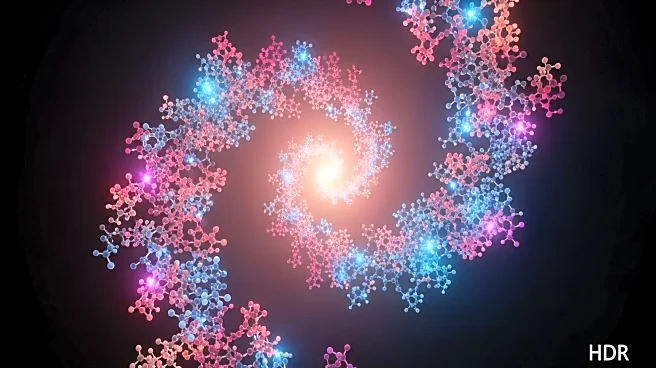What is the story about?
What's Happening?
Chemists at University College London have successfully replicated a crucial step in the creation of life by joining RNA and amino acids under conditions mimicking early Earth. This experimental work, led by chemist Jyoti Singh, aims to provide insights into the origins of the biological relationship between nucleic acids and proteins. The research utilized thioester, a high-energy compound, as a mediator to facilitate the binding of amino acids to RNA. This breakthrough unifies two prominent theories regarding the origin of life: the RNA world hypothesis and the thioester world hypothesis. The study demonstrates how RNA might have first come to control protein synthesis, a fundamental process for life.
Why It's Important?
Understanding the origin of protein synthesis is crucial for comprehending how life began on Earth. This research could significantly impact the field of synthetic biology by providing a model for how life's building blocks might have formed naturally. The ability to replicate such processes in a laboratory setting could lead to advancements in creating synthetic organisms, potentially revolutionizing biotechnology and medicine. The study also bridges two major hypotheses about life's origins, offering a more comprehensive understanding of the early biochemical processes that led to life.
What's Next?
The next step in this research is to determine if RNA will preferentially bind to specific amino acids that could facilitate the emergence of genetic code. This could lead to a deeper understanding of how genetic information was first encoded and replicated. Future studies may focus on replicating more complex molecular interactions and exploring the potential for synthetic life forms. The findings could also spark discussions on the ethical implications of creating synthetic organisms and their potential applications in various industries.
Beyond the Headlines
This research highlights the potential for synthetic biology to replicate fundamental life processes, raising questions about the ethical and legal dimensions of creating synthetic life. The ability to synthesize proteins and nucleic acids could lead to long-term shifts in biotechnology, impacting everything from drug development to environmental sustainability. The study also underscores the importance of interdisciplinary research in solving complex scientific questions, combining chemistry, biology, and physics to explore life's origins.
















